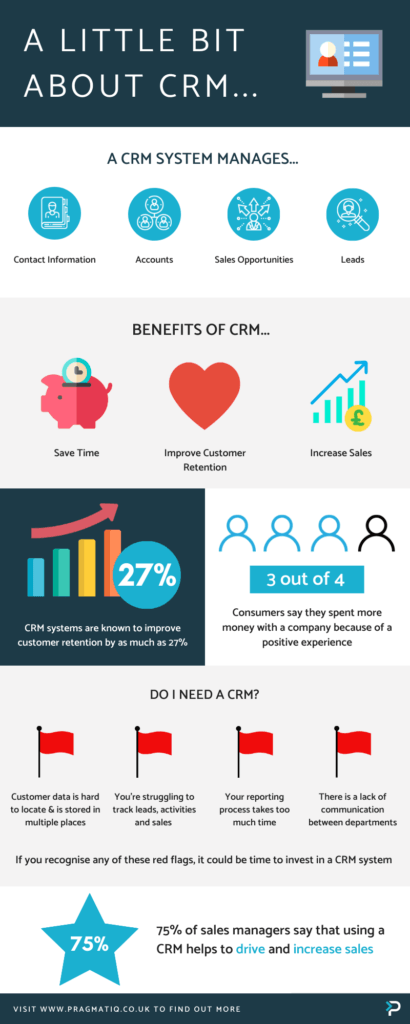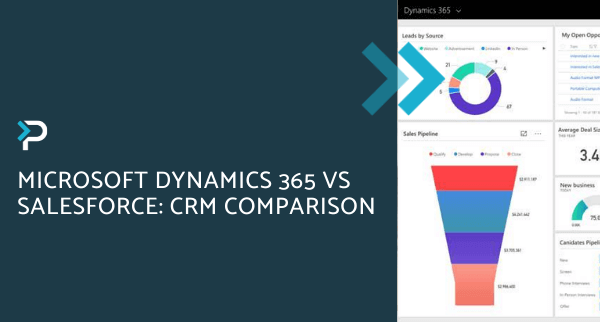CRM stands for Customer Relationship Management. As the name suggests, a CRM is software for managing your relationships with your customers.
For most businesses, customers are the most valuable asset and therefore it is essential to ensure you know who they are and how they interact with your company. In the early days of business, your customer information may be stored in multiple places; within your sales rep’s head, in an inbox, on a spreadsheet, or in a notebook. As a company grows and increases in size it can quickly become apparent and necessary to centralise customer data. The efficiency and productivity of your team rely on them being able to respond quickly to important questions related to your customers; who are they, how can you contact them, what has your previous interaction with them been and where are they within your sales pipeline?
Everyone on your team should have the ability to access your customer data and this is the challenge that a CRM solution is designed to solve.
Who should use a CRM?
In brief, any company that wants to maintain and nurture their relationships with their customers can benefit from a CRM solution. To be more specific, there are two types of company that more often we see benefit the most:
- B2B companies – typically this type of business needs to track leads through a sales cycle
- B2C companies – examples of this type of company are estate agents, retail and trades
A way of identifying if a CRM system can help your business is to analyse some of the business challenges you want to solve. For example:
- Improve client retention rates
- Centralise and organise your business data
- Increase employee accountability
- Forecast sales trends more accurately
- Track leads and lead activity
- Monitor customer base
If you answered yes to one or more of the questions above, it sounds like your business could benefit from a CRM.
If you’re new to CRM, business software or Dynamics 365 we have created a useful glossary of some of the terms you might hear to help you navigate through the jargon – Click here.
Why do I need a CRM?
As we mentioned above, often the best way to explore whether you need a CRM is to identify the challenges you want to solve across your various business departments.
Improve Lead Management
Historically customer data has been stored across a variety of devices and places; spreadsheets, notepads and back in the day a desktop Rolodex. Needless to say, these methods of storing data all come with their own risks. A CRM is designed with lead management in mind, to not only offer users a great experience but also to:
- Store detailed contact information regarding leads and customers
- Track where a customer is with your sales pipeline
- Store information about products or services they have previously been or may be interested
- Track communications
Your sales team is also able to see the communication trail to understand who is following which leads and additionally reminders can be automated to ensure an opportunity is not missed. If you choose to implement a Bespoke CRM, your system can be customised to track other important information that is specific to your company.
Enhance Collaboration
If you have your data stored across different products or devices, various people could be working on different versions and therefore changes are not being tracked or updated in real-time. A CRM overcomes this challenge by centralising your data; multiple users can view the records simultaneously and changes are synced so they can be viewed instantly by others. Your information can also be accessed from any mobile device, allowing your team to work from any location.
Build Integrations
When transferring information between business systems and programs you may face restrictions. This can be a real challenge to overcome and cause delays in your working processes. A CRM solution is designed to integrate with other applications, which allows data to flow seamlessly between them without the need for manual input or intervention. Additionally, most CRM solutions offer email integration, which enables users to track and view emails within the CRM. The huge advantage of this is, that your team gains full transparency of all correspondence, so you are able to follow the line of communication easily.
Improve data security
As we mentioned above, in the past your data may have been stored in multiple places and if you have been using spreadsheets, there is little security around your information. Additionally, if an employee were to leave with files saved on to their personal device, your business could be left exposed. A CRM provides you with security for your data by using a secure sign in system. Permissions can be set around particular areas enabling you to only grant access to those that need it. Therefore, if an employee were to leave, you can simply deactivate their account.
Improve reporting
If you are storing your data in spreadsheets then you will most likely have the ability to produce graphs, charts and reports. However, unless you have the skill to extract and analyse this data, it can be difficult to gain valuable insight. Additionally, spreadsheets lack the ability to offer real-time accuracy which is vital in allowing you to make critical business decisions in the fast-paced and competitive market in which we all operate. Most CRM systems have built-in dashboards and reporting capabilities to provide you with a clear and accurate overview of your data. Additionally, there are tools which integrate with a CRM, such as Microsoft Power BI, which allows you extra visualisation functionality enabling you to drill-down further to gain valuable insights.
Check out our infographic below…

Get in touch
If you would like more information about CRM Software, please get in touch via the contact form, or email us at info@pragmatiq.co.uk / call us on 01908 038110.
Want to keep in touch?
Sign up to our newsletter for regular updates.
"*" indicates required fields

